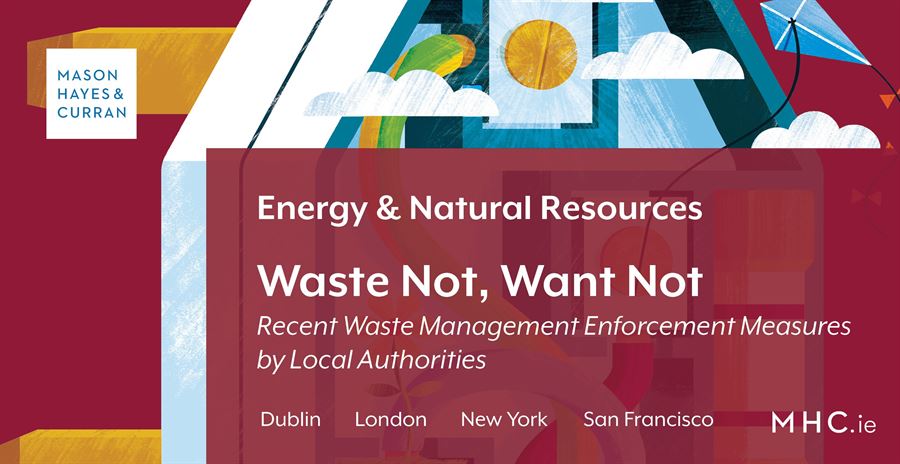
The Environmental Protection Agency (EPA) has recently assessed the environmental enforcement activities of local authorities in its annual performance report. We summarise their key findings in the area of waste and consider the recommendations made where improvement will hopefully enhance environmental enforcement.
Illegal waste activities
The EPA recommends that local authorities should focus resources on identifying illegal waste activities. Waste crime can potentially cause harm to the environment and human health. A co-ordinated approach to tackling waste crime is best achieved by the engaging with any of the three national Waste Enforcement Regional Lead Authorities (WERLAs).
Interagency co-operation between the WERLAs and other regulatory authorities such as the Revenue Commissioners, An Garda Siochána and the Health and Safety Authority has resulted in an intelligence led approach to ensure robust enforcement is taking place at difficult sites. Illegal dumping and unauthorised movements of waste are also targeted by local authorities. For example 47 unauthorised waste facilities were identified in 2018.
Brown bins
Better segregation of food waste at source is required and this continues to be a national priority. This includes focusing on the provision and proper use of brown bins. Local authorities should focus on the householder and businesses that are responsible for the segregation of their waste to ensure that they are meeting their legal obligations. Both enforcement and educational actions are suggested by the EPA as strategies to improve compliance in the national roll out of brown bins.
Local authorities have been proactive in recent months in seeking relevant information from authorised waste collectors on the provision of brown bins in accordance with the European Union (Household Food Waste and Bio-waste) Regulations 2015. In addition appropriate criminal prosecutions and injunctive proceedings pursuant to the Waste Management Act 1996 have been initiated in the District Courts and High Court.
Under the Landfill Directive (1999/31/EC) Ireland must meet targets for the diversion of biodegradable municipal waste from disposal to landfill. The enforcement actions will hopefully assist Ireland in achieving the objective of just 10% of waste going to landfill by 2030.
Construction sites
Waste management at construction sites was assessed in 2018 with only 56% of first inspections finding appropriate waste management.
Local authorities will prioritise inspection of construction sites to confirm appropriate management at the beginning of the waste management process and plan for repeat visits where necessary, as recommended by the EPA. The WERLAs also implement and design a programme to monitor construction and demolition waste activities.
Conclusion
Multi-agency inspections and investigations are an increasingly effective tool in waste enforcement, in particular for more complex situations which local authorities routinely face. There has been a continuous improvement in recent years in the coordinated enforcement of national and EU waste legislation. It is envisaged that Ireland will continue to robustly target illegal waste activities. This approach should result in favourable outcomes for producer responsibility initiatives while also focusing on circular economy principles.
Local authorities should ensure that their environmental enforcement strategies and teams are coordinated in line with best national practice in order to improve overall compliance with waste management legislation.
For more information on the likely impact of the proposed measures, contact a member of our Energy or Health & Prosecutions teams.
The content of this article is provided for information purposes only and does not constitute legal or other advice.
Share this:






